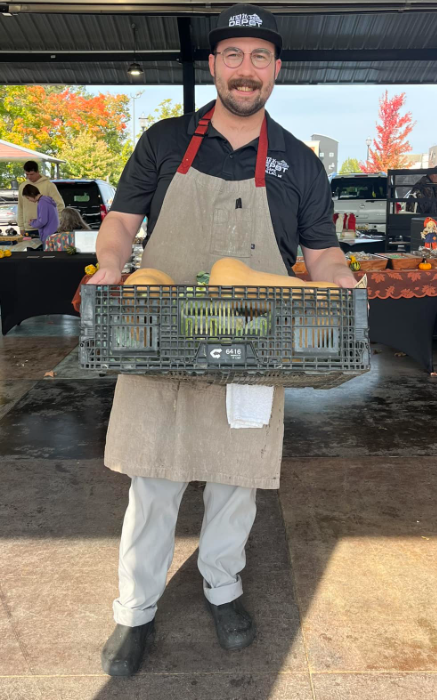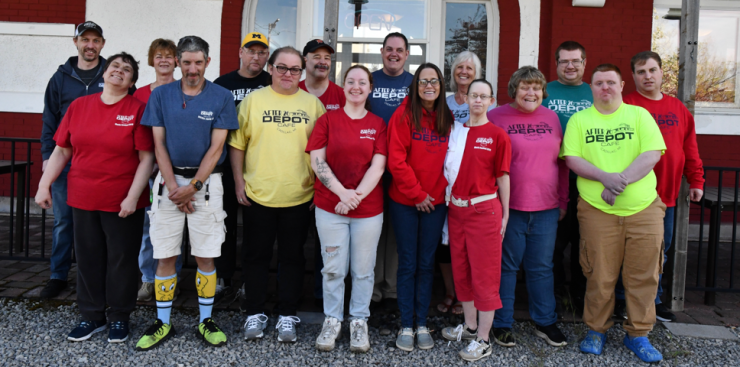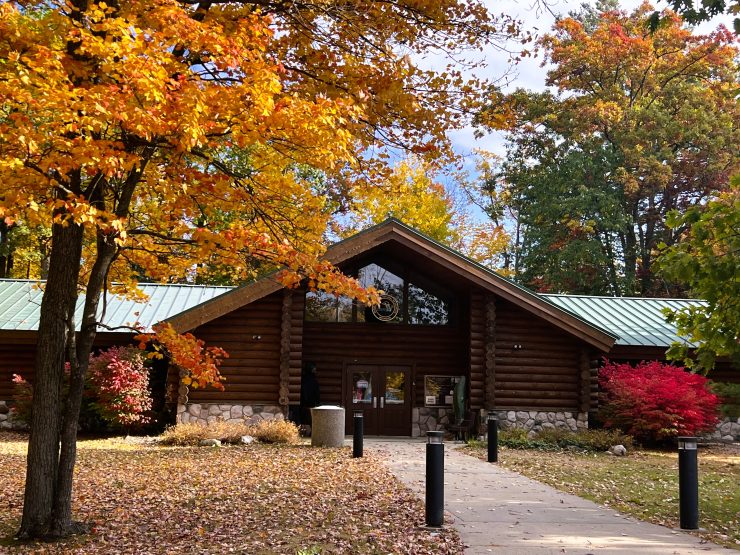Lake Cadillac in Cadillac, Michigan, is the backdrop for the former 1910 Ann Arbor Train Depot. The hardwoods, aflame with fall color, frame the structure in this northern Michigan town. By 10:00 a.m., the After 26 Depot Café is buzzing with families and friends, all eager to share a leisurely Sunday morning breakfast. Early 20th-century architectural details, like the hammered tin ceiling and exposed brick, add interest to the dining room. During the week, trains still run on the track directly next to the patio, shaking the whole building.

Executive Chef Matthew Houk
Photo Courtesy of the After 26 Depot Café
A Project Worker greets guests, takes them to their table, and provides a menu. Another confident young man made sure that my water glass was full. “You couldn’t come in and not smile. This is a light, happy, uplifting place,” said General Manager and Executive Chef Matthew Houk. His words reflected my feelings as I ordered breakfast and drank my morning coffee. On this warm autumn morning, the sun shines on the patio as I take in the views of Lake Cadillac.
The Mission
The mission extends beyond the typical restaurant’s objective of feeding people. The After 26 Depot Café provides employment opportunities for adults with developmental disabilities and cognitive impairments.
The phrase “After 26” refers to the age at which individuals with developmental disabilities and cognitive impairment can no longer attend public school in Michigan. Once those with special needs can no longer go to school, they’re often left with nothing to do.
At After 26 Depot Café, individuals with special needs find purpose and a place in the community.
The Café’s History
For individuals aging out of the school system, it’s a challenging and confusing time. Suddenly, there is a void in their lives, and they may have nothing to occupy the time previously filled with school activities. This can adversely affect the families, as their loved ones struggle with what to do next.
In 2007, a group of like-minded people began the process of opening a restaurant that would help fill that void and provide jobs in the greater Cadillac community. Retired teachers, municipal workers, and private sector professionals formed the original volunteer board of directors.
The Junction of Hope, a restaurant in Chesaning, Michigan, inspired the After 26 Project. It was the first non-profit restaurant in the United States devoted to employing developmentally disabled and cognitively impaired adults. Following the Junction of Hope example, in the summer of 2008, the After 26 Project obtained tax-exempt status. It took five more years to open the restaurant. Finally, after renting and renovating a portion of an AMVET facility, the community-wide effort became a reality. The After 26 Depot Café opened on June 4, 2013.
Another critical aspect of their mission is that Project Workers perform their work in public rather than doing piecework in a sheltered workshop. Sheltered workshops aren’t bad; working is better than sitting at home without a job. However, one part of the After 26 mission is to educate the public that developmentally disabled adults can perform in the workplace if given a chance. This need exists in Cadillac, Michigan, and across the United States.

Photo Courtesy of After 26 Depot Café
Today’s After 26 Depot Café
Today, the After 26 Depot Café employs approximately 16 Project Workers who perform various tasks around the restaurant. Three employees have worked at the café since the beginning. Typical jobs include greeting customers, taking water to tables, washing dishes, busing and wiping down tables, cleaning menus, and performing janitorial duties. A volunteer board of directors oversees The After 26 Depot Café, and a General Manager handles the daily operations. Non-project workers act as servers and cooks.
While Project Workers don’t work on the kitchen line cooking, they perform some prep work, such as portioning jams and salad dressings, spiralizing sweet potatoes, and washing dishes.
The Menu
After 26 Depot Café offers a diverse menu that includes breakfast and lunch six days a week. The train-themed menu includes references to stations, hoppers, and depots, as well as some train-related graphics, and is seasonal.
They also offer a weekly menu to provide more variety and take advantage of the local produce Chef Houk finds at the local farmers’ market. He likes to hear guests ask, “Oh, I know that farm. You made this with their produce?”

Seasonal Offerings
While I had difficulty selecting from several appealing choices, I finally settled on the seasonal crepes. The light golden-brown crêpes were filled with cubed apples sautéed in butter and lightly spiced with warm fall spices like cinnamon. The apples were mixed with a cider reduction, then rolled up in the crêpes, sprinkled with powdered sugar, and topped with whipped cream for an Instagram-able presentation.

The lunch menu offers soups, salads, and sandwiches. It also has heartier choices like burgers, fish and chips, chicken tenders, and fries. A Michigan favorite is the Cherry Grove salad, which starts with a bed of greens topped with dried cherries, Mandarin oranges, red onions, feta, and pecans. The chef dresses it with a cherry vinaigrette. Add grilled or crispy chicken or smoked salmon to make the salad an entrée.
The After 26 Depot Café’s success has inspired other local businesses to open their doors to Project Workers. For instance, one worker has found an additional role at a local BBQ restaurant. Project Workers are no longer part of the shadow community but integral to a supportive network.
The After 26 Project has merged two important local missions, restored a local historic treasure, and empowered adults with disabilities.
“Everybody has a place in this world. Everybody has a purpose. And we are so blessed to help them fulfill that,” Molly Nelson, the former General Manager, said.

If You Go
Cadillac, a town of 10,450, is in northwest Michigan, about 175 miles northwest of Lansing. Lake Cadillac, Lake Mitchell, and Mitchell State Park are popular places for water-related activities. The state park offers a 2.5-mile Heritage Nature Trail through woodland and marsh, so this area is excellent for outdoor recreation.
For more information on planning your trip, check out Cadillac Michigan.
If you’re in Northern Michigan looking for more things to do, check out this article:
Cadillac Michigan Visitors Bureau hosted my stay.
Amy Piper writes on her blog FollowthePiper.com.

